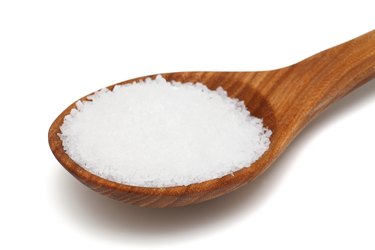
The DASH diet is an acronym for Dietary Approaches to Stop Hypertension. Following this diet can help lower blood pressure, coronary disease risk and risk of stroke by 5 to 8 percent in individuals with hypertension, according to "Essentials of Exercise Physiology." The DASH diet emphasizes fruits and vegetables, the avoidance of dairy products and fat and the minimization of sodium.
Calorie and Nutrient Goals
Video of the Day
The DASH diet is based on a 2,100-calorie diet. According to the DASH program, dieters should aim to consume 27 percent of their total calories from fat, 18 percent from protein and 55 percent from carbohydrates. Saturated fat should account for no more than 6 percent of total caloric intake, while cholesterol should be restricted to 150 milligrams or less. DASH dieters should also aim to consume at least 30 grams of fiber each day.
Video of the Day
Specific Micronutrient Goals
While the DASH diet does not provide specific guidelines for all vitamins and minerals, it provides recommendations and limitations for sodium, potassium, calcium and magnesium. According to the DASH program, dieters should limit sodium intake to 2,300 milligrams a day, obtain 4,700 milligrams of potassium, 1,250 milligrams of calcium and 500 milligrams of magnesium. A sodium intake of 1,500 milligrams or less is recommended for dieters with high blood pressure, as well as African-American populations.
Grains and Grain Products
The DASH diet recommends that individuals who consume a 2,100-calorie diet include 7 to 8 servings of grains and grain products each day, and at least three from whole grain foods. The DASH diet emphasizes consuming the majority of your calories from these complex carbohydrates to minimize excess fat in the diet.
Fruits and Vegetables
The DASH diet recommends consuming 4 to 5 servings of fruits and 4 to 5 servings of vegetables each day, respectively. Fruits and vegetables can contribute to your daily carbohydrate needs, while also providing an abundance of vitamins and minerals that can not be met through other dietary sources.
Dairy Products
DASH dieters should consume only low-fat or fat-free dairy products, and limit their dairy servings to just 2 to 3 each day. Dairy products are important to the diet because of their vitamin, mineral and protein content, although they tend to be high in fat and cholesterol.
Meat, Fish and Poultry
The DASH diet plan recommends consuming only lean sources of meat, fish and poultry to meet your protein needs, and limiting servings to just two or less each day. While animal products are high in protein, they can be high in fat, cholesterol and sodium, all of which contribute to hypertension. You can meet much of your protein needs through plant foods.
Nuts, Seeds and Legumes
Nuts, seeds and legumes are healthy sources of lean and cholesterol-free protein, unsaturated fat and vitamins and minerals. The DASH diet plan recommends consuming 4 to 5 servings of nuts, seeds and legumes each week. Since sodium intake is a concern, aim to consume unsalted nuts, seeds and legumes.